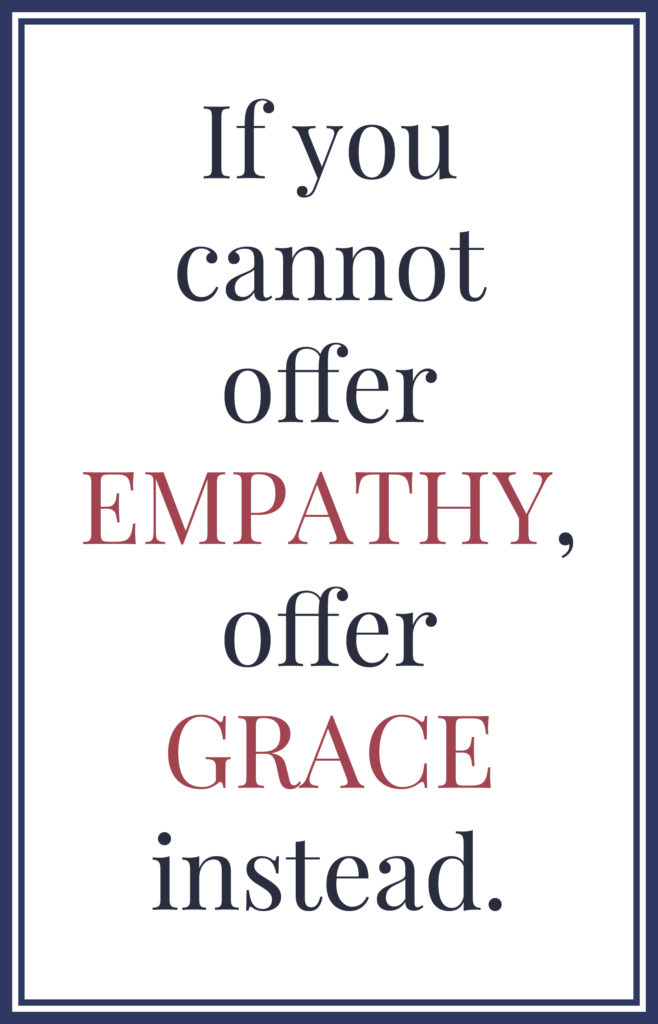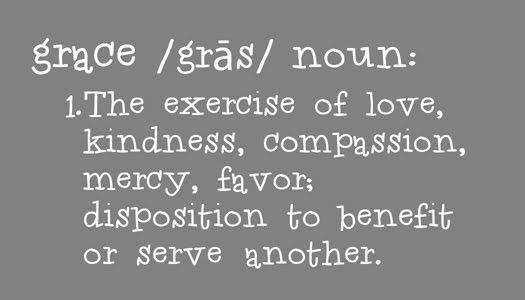This week, I’ve been thinking a lot about empathy. As life does, the longer it goes on, the more experiences we gain. And recently, for me, there have been several “Ah-ha!” moments, where I’ve realized that where I had been unyielding in the past, I now “get” the other point of view. I’m gaining empathy. And where my empathy is lacking, I’m learning to practice grace.
Having empathy is different than having sympathy.
Empathy is the ability to understand and share the feelings of another. Sympathy is feelings of pity and sorrow for someone else’s misfortune.
I remember learning the difference in grade school on a list of most commonly misused words. Alas, many people as adults still don’t know the difference, but I think it’s an important one.
Why? Because it’s hard to have empathy. Empathy requires experience, and until we’ve walked in another person’s shoes, we may find it difficult or impossible to understand the emotions they are experiencing or why they do the things they do.
Is it fair for us to judge others based on our own experiences?
I don’t think so. But we do this all the time—not because we are bad people, but because we lack empathy. We can only filter things through the context of our own reality. So how are we to offer others genuine and sincere understanding all of the time?
The answer is: We can’t.
And that’s okay. This is where grace comes in.
Let me give you a few examples.
1.) Losing a family member or close friend
I think this is a good one, because we all have friends who have lost a parent or sibling, but maybe we personally haven’t lost someone close to us yet. I fall into the latter category, where I have never lost someone in my immediate family or one of my close friends. As a result, I can’t relate to those people that have. Both men that I’ve dated have lost a parent, and when they talk about the experience, I have sympathy for them, but I ultimately have no idea what it feels like. Empathy is beyond me. It makes me feel slightly uncomfortable, just because I have no idea how to react or what to say or not say. In these moments, all I have to offer is grace.
Grace is defined as a controlled, polite, and pleasant way of behaving; an act or instance of kindness, courtesy, or clemency.
2.) Being scared
For some reason, we find this easier to practice with children than adults. When children are afraid, we offer them grace and reassurance. Empathy comes easily because we all remember when we were scared as kids. But as adults, when other adults are scared, we often ridicule, tease, or belittle. Why is this?
In adulthood, we are expected to go forward fearlessly, with confidence. But things outside our realm of experience or comfort zone can still be very scary. Some soldiers are afraid of what waits for them overseas. Your teenager may be scared to drive in a construction zone when they are still learning. Your 36-year-old girlfriend may be nervous to walk alone at night. We shouldn’t ridicule these people for their fears. What good does that do? If we cannot relate to their fears or don’t understand why they are so scared, we should offer them grace and kindness instead of calling them irrational, silly, and overreacting.
What may seem irrational to you, is perfectly rational to someone else. They aren’t crazy. It’s simply how they experience the world. Don’t punish others for not experiencing the world in the same way you do.
When you fail to understand, offer grace. Practicing kindness will not only make your friend feel better, but it will make you feel better too, and maybe give you some perspective if you take the time to understand their point of view. Try asking them why they are afraid; if they can explain it to you, maybe you’ll learn something.
3.) Extended family
We’ve all heard the stories about mothers-in-law, fathers-in-law, the inappropriate uncle, etc. I have a story of my own. When I married Frank, it was my hope that I could adopt his family into my heart, and I greatly desired to be adopted by them in return. But this didn’t happen. I was 17 when he introduced me to them, and by all accounts, I still felt like a kid. (Heck, I still feel like a kid sometimes.) But I was 17 and full of ideas and dreams and trying to discover myself. I got excited easily about things, would read all I could, and then try to implement new ideas into my life.
For whatever reason, they did not approach me or engage me in conversation. When I did talk, my lifestyle ideas were so radically different from theirs, I believe they thought I judged them. From my point of view, I was excited about what I was learning. And I was excited that as I changed my diet, my health improved. I was on a journey to feel better in my own skin.
When I declined to eat a niece’s birthday cake, it was not because I looked down my nose at everyone for eating something “unhealthy,” but because if I were to eat the cake, my stomach would hurt, my skin would break out, and I would pay for it with my health for 2-3 days.
When I expressed at age 18 that I thought a 3,000 square foot house for $30k was “cheap,” it was because I didn’t understand “location, location, location” and why a house that size might be $30k in rural Kentucky, but $600k in Franklin, TN, where I grew up. I wasn’t trying to put on airs or imply that I was higher class than someone else. I didn’t grow up wealthy, but I didn’t grow up poor either. My mom’s a school teacher. We made do, but there were no extras. It was a lack of experience, not haughtiness that made me say that comment. I just wish that those people 10-40 years my senior could have seen my lack of experience and forgiven me for it instead of taking offense and holding it against me several years later.
When I posted an article on my Facebook urging parents to educate before they vaccinate, it was not to accuse all parents that have chosen vaccinations as being bad or evil. MY OWN MOTHER vaccinated me, and I don’t hold a grudge against her. I prefer to be informed about things that can alter my body (since it’s the only one I’ve got), and since so much of the things marketed to us are for profit, not necessarily the benefit of the people, I think it’s important to educate yourself as best as possible. But I’m not JUDGING you because you make different choices than me.
We all make choices based on our life experiences. On ours and ours alone. If we can’t offer empathy, offer grace instead.
Empathy takes experience. Grace takes practice.
I will admit, I did not practice grace with Frank’s family when I was younger. I was too immature for that. A few of them harassed me on Facebook, as well as verbally harassed me in person. No one offered me empathy. No one offered me grace. They were uninterested in hearing my point of view. So I felt hurt. I felt wronged. I felt jilted. I became indignant.
I cried into my pillow. I asked “why me.” I wrote long-winded journal entries about how “unfair” it was. I complained to Frank that they didn’t like me. I didn’t understand what I had done to make them think I was so different than how I viewed myself. I wanted them to stop taking my world-view personally and stop assuming that I was judging them every time I asked about their lives. I simply wanted them to understand me. I wanted them to be my second family. But convincing them to be interested in me wasn’t up to me. It was up to them.
Recently, I was offered a situation that gave me some insight into the situation. Frank and I are no longer together, and I’ve been dating a man named Josh. Josh grew up differently than me, and the other day, he was upset and worried that my family doesn’t like him. “They hate me!” he said. “I don’t feel like they’ll ever accept me. They don’t want us to be together.” Now, to be fair to him, there are some things that my family doesn’t approve of, but they certainly don’t hate him. Hearing Josh accuse my family of hating him made me feel defensive and hurt.
But as soon at the words left his mouth, I realized that I’d said the same thing to Frank. “Your family hates me! Why don’t they want us to be married? Why don’t they realize how much I love you? They should accept me if they love you!”
I didn’t realize how much I must have hurt Frank with those words until I experienced almost the exact situation.
I immediately called Frank to apologize. “I finally have empathy for you,” I told him. “I’m sorry for saying your family hated me. Even if they don’t like me, it wasn’t kind of me to say things like that to you. It wasn’t your fault, and I didn’t realize how much it hurt you.” And I decided that day to let go of the hurt feelings I’d been holding for his family and forgive them.
But even back then, when I didn’t have the capacity for empathy, Frank offered me grace—even when I hurt his feelings. And he offered me grace again when I apologized.
Make the world a better place
We all fall short and need a little grace. Practice grace, starting today, with the people around you. You may not always understand them, but that’s okay. A little kindness goes a long way to building bridges. Remember, empathy takes experience. Grace takes practice. If you cannot offer empathy, offer grace instead.











wise words to live by!
HUGS to you, Courtney!
Courtney this really resonated with me as I am going through a lot of what you’re going through right now. I am now a person on BOTH sides of a divorce (the left and the leaver) and I have so much empathy for both of my former spouses as a result. Thank you for sharing your brave, humble heart with us.
I needed this today. Thank you. You are a beautiful person Courtney.
Thank you. That was beautifully written and thought out. I too strive to be graceful even though I am not always successful.
I have followed your blog for a while and missed seeing you on my fb thread when you disappeared for a while. I’m glad to see you back, even though sad for the reason of your absence.